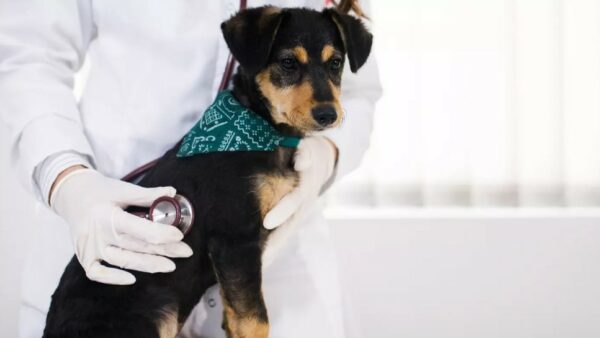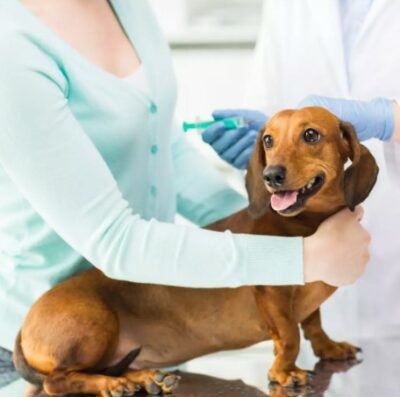What is kennel cough in dogs?

WHAT WILL YOU READ IN THE TEXT:
How is kennel cough transmitted?
Symptoms of kennel cough in dogs
Treatment of kennel cough in dogs
Can I prevent kennel cough in my dog?
Tis the season for kennel cough in dogs, and veterinary clinics are overflowing with dogs infected by this disease every year around this time.
Kennel cough, or infectious tracheobronchitis, is a highly contagious respiratory disease in dogs. But what causes kennel cough in dogs and how can you prevent your pet from becoming infected with this disease?
How is kennel cough transmitted in dogs?
Dogs usually get infected with tracheobronchitis in places where many animals congregate, such as shelters, dog parks, training groups, exhibitions and the like.
A dog can infect another dog through direct contact (such as nose-to-nose), contaminated surfaces (including food and water bowls), but the infection can also be transmitted through the air. Kennel cough is usually treated without problems in healthy adult dogs, but can be dangerous for puppies younger than 6 months or dogs with weakened immune systems.
How do you recognise kennel cough in a dog?
If your dog is infected with tracheobronchitis, you will notice at least one of the following symptoms: 
- Severe cough, often with a characteristic sound that often makes owners think something is stuck in the dog's throat (the most common symptom)
- Runny nose and discharge from the nose or eyes
- Sneeze
- Listlessness (fatigue, sluggishness and lack of energy)
- Reduced appetite
- Increased body temperature
Although kennel cough in healthy dogs can usually be treated without any problems, it is extremely important to consult a vet in case of cough symptoms. This is because these symptoms may also indicate another, more serious illness.
For example, the dog flu virus often starts with almost the same symptoms as kennel cough. Other conditions that can cause cough in dogs include bronchitis, asthma or even certain heart problems.
Treatment of kennel cough in dogs
Mild cases of kennel cough are usually treated by giving the dog a week or two of rest. Nevertheless, the vet may recommend antibiotics to prevent secondary infections, as well as cough suppressants to relieve symptoms. It is very important to strictly follow the vet's instructions and make sure your dog does not exercise during the illness.
In addition, if your dog is infected with tracheobronchitis, it is advisable not to use a collar but switch to a harness. Irritation of the area around the trachea, where the collar puts direct pressure, can aggravate the cough and cause further damage to the neck.
If you have several pets and one of them is infected, it is very likely that the others have also been exposed. It is therefore important to monitor their health too and take them to the vet if necessary.
Can I prevent kennel cough in my dog?
There is a vaccine against kennel cough that protects dogs against the bacteria Bordetella bronchiseptica, the most common cause of kennel cough. 
This vaccine is especially recommended for dogs participating in sports competitions or regularly interacting with groups of dogs. The vaccine is available in two forms: by injection or intranasally (through the nose).
However, keep in mind that there are other causes of kennel cough and the vaccine does not completely guarantee that your dog will not get sick. However, the vaccine does significantly reduce the risk of infection.
It is always wise to consult with your vet. They can best advise and inform you about the kennel cough vaccine.
CONCLUSION
Kennel cough is a common illness in dogs, usually of a mild nature and often passing by itself without specific treatment. Nevertheless, it is always important to contact your vet to make an accurate diagnosis and determine the right treatment.
If your dog has kennel cough, make sure he gets plenty of rest and avoid long walks or intense activities until the illness is completely gone. In addition, it is always advisable to use natural nutritional supplements to strengthen your dog's immune system. This will allow your beloved four-legged friend to recover faster and enjoy his favourite activities again.
